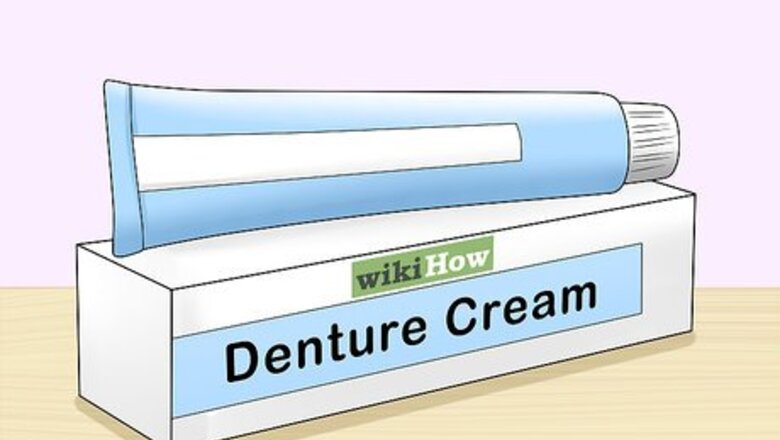
views
Choosing a Denture Adhesive

Choose an over-the-counter denture cream for a secure fit. Of all adhesive options, denture creams are most common and tend to offer the best grip. Denture creams come in a variety of flavors and adhesive strengths. Choose the one that meets your preferences best from your local pharmacy. In comparison to adhesive powders and wafers, denture creams tend to offer the best retentive properties.
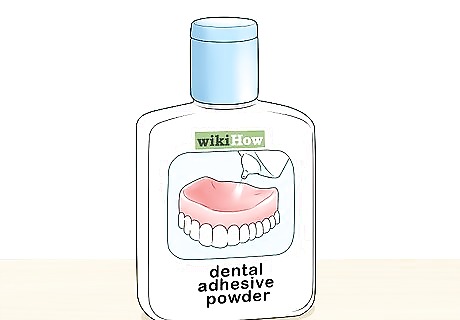
Try dental adhesive powders if you have a dry mouth. Dentures usually rely on a thin layer of saliva to adhere to the gums. If you suffer from oral dryness, your bottom dentures may not fit as securely. Denture powders are ideal for those with dry mouths, as they adhere firmly to the gums for up to 12-18 hours at a time.

Use denture wafers for individuals with narrow jaws or taste/texture issues. Denture wafers are usually tasteless and ideal for those who dislike strong flavors or textures. They also offer a more secure denture fit for individuals with narrow or flat jaws. If you meet either of these descriptions, denture wafers might be the most comfortable option. Wafers tend to be the least retentive of all denture adhesive options.
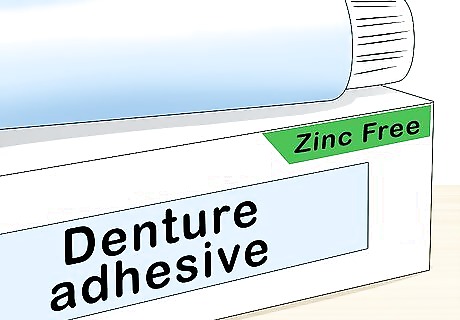
Buy a zinc-free denture adhesive to prevent nerve damage. Excessive zinc intake can deteriorate your health over time, causing nerve damage and numbness to the extremities. Check the ingredients list on the denture adhesive before purchasing it to avoid buying products made with zinc.
Applying Denture Adhesives
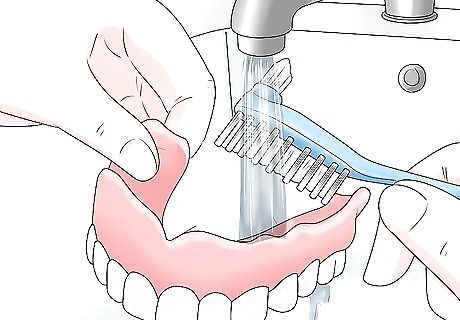
Wash and dry your dentures before applying the adhesive. The denture adhesive will adhere best to your bottom dentures if they are clean and dry. Brush your denture with a specialized brush, then soak them in a denture cleaning solution. Dry your dentures off with a towel before applying the cream to prevent slippage.
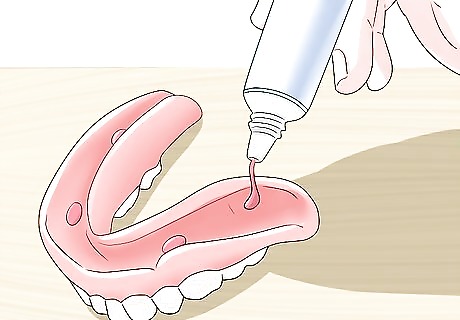
Apply a cream to the dentures in small dots or strips. Apply 3-4 dots or strips of denture cream along the bottom of the inner lining. Avoid placing the creams too near to the edge of the dentures. Adding dots to the center will help the dentures stay more tightly adhered. Start with a smaller amount of denture cream and apply more if needed.

Cover the bottom dentures evenly in the adhesive if using a powder. Place the dentures on a flat surface and hold the powder bottle directly overhead. Gently tap or shake the bottle over the dentures, covering the entire surface that touches the gums in an even layer of powder. A fine coating is usually enough to adhere the dentures to your gums. Shake your bottom dentures to remove any extra coating, then tap them while holding them upside down.
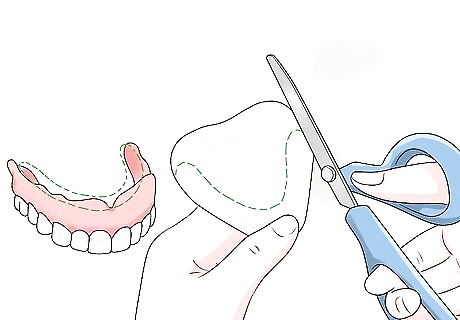
Cut the adhesive to match the shape of your bottom dentures if using wafers. Place a denture wafer strip over your bottom dentures and cut it to the shape of your dentures' gumline. Trim away any overlapping areas until the fit is as close as possible, then place the denture wafer inside the gumline.
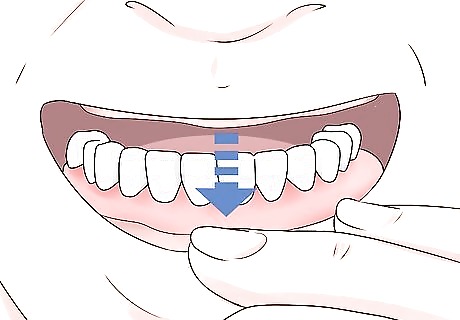
Press the dentures tightly into place. Hold the dentures against your bottom gums firmly and bite down for several seconds. This should secure the adhesive's hold for the whole day. If your bottom dentures start to slip at any point, apply more denture adhesive as needed.
Practicing Good Denture Habits

Speak slowly while wearing your dentures. Sometimes, especially if you're new to wearing dentures, talking too quickly can dislodge them. Focus on enunciating each word clearly and slowly. If your bottom dentures start to slip while you talk, bite down and swallow to shift them back in place. Make a mental note of which words or sounds tend to make your dentures move around so you can practice them in private.

Clean your dentures every day. Taking good care of your dentures will help prevent them from losing their shape. Thoroughly clean them in the morning with warm water and a soft-bristle brush. Never use toothpaste or household cleaners on your dentures. Any cleaners that are not made for dentures can ruin them.
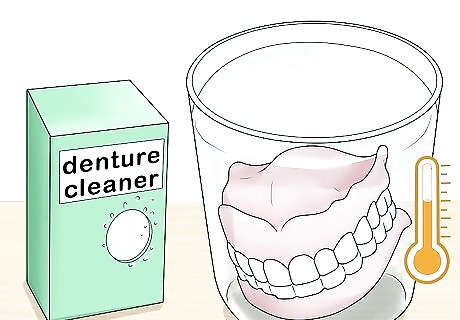
Store your dentures in a mixture of cleaner and warm water overnight. Soak your dentures every night in a denture cleaner mixed with warm water. The cleaner must be specially made for dentures, as other cleaners can eat at their shape over time. Never place your dentures in hot or boiling water, as this can cause your dentures' shape to warp over time.

Try soft foods if your dentures often get dislodged while eating. If your bottom dentures tend to come loose while eating, try taking small bites of soft foods like yogurt or mashed potatoes. Chew on both sides of your mouth to prevent your dentures from tipping or shifting as you eat. Eggs, applesauce, soup, smoothies, sherbets, and rice are all great soft foods to eat with dentures. If your dentures cause pain or soreness while you're eating, they may be ill-fitting. Schedule an appointment with your dentist to get your dentures adjusted.

Never sleep with your dentures in. If dentures are worn for 24 hours a day, they can wear down your cheekbone volume and density. Over time, this can drastically alter your face shape and ruin the overall fit of your dentures. Take your dentures out every night while you sleep to give your mouth some needed rest.
Discussing Issues with Your Dentist

Visit a dentist annually to check your dentures' fit. Most dentists suggest that individuals with dentures come in for an annual checkup to test for sizing issues. Getting a checkup at least once a year will help your bottom dentures stay in ideal shape. If your dentures feel loose before the year is up, schedule an appointment early to discuss possible causes with your dentist.

Ask your dentist about denture relining to fix looseness. If your bottom dentures are constantly loose, your dentist may suggest relining your dentures. Relining involves adding a layer of material into the dentures to mold to your gums. This is a common fix for loose dentures if they are still in good condition and the patient is not yet due for a new pair. Depending on your needs, your dentist might do a temporary or permanent relining.

Get a new pair of dentures every 5 years. The lifespan for most pairs of dentures is about 5 years. After that much time has passed, talk to your dentist about getting a new set of dentures. If your bottom dentures are damaged or loose enough that your dentist feels that relining won't help, they might suggest getting a new pair of dentures.
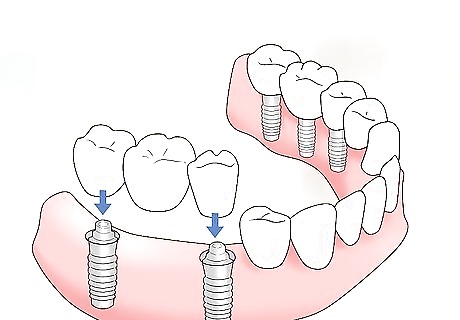
Consider teeth implants if your bottom dentures will not stop slipping. Although more expensive than conventional dentures, tooth implants are the best at mimicking real teeth and do not come loose. Ask your dentist about whether you are a good candidate for dental implants and, if so, how much the surgery would cost.


















Comments
0 comment